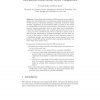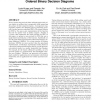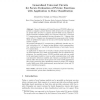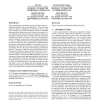24 search results - page 2 / 5 » Information-Theoretic Conditions for Two-Party Secure Functi... |
CRYPTO
2000
Springer
13 years 9 months ago
2000
Springer
Secure Function Evaluation (SFE) protocols are very hard to design, and reducibility has been recognized as a highly desirable property of SFE protocols. Informally speaking, reduc...
CCS
2006
ACM
13 years 9 months ago
2006
ACM
Privacy-preserving protocols allow multiple parties with private inputs to perform joint computation while preserving the privacy of their respective inputs. An important cryptogr...
ICISC
2008
13 years 6 months ago
2008
Secure Evaluation of Private Functions (PF-SFE) allows two parties to compute a private function which is known by one party only on private data of both. It is known that PF-SFE c...
ACNS
2009
Springer
13 years 12 months ago
2009
Springer
Abstract. Two-party Secure Function Evaluation (SFE) is a very useful cryptographic tool which allows two parties to evaluate a function known to both parties on their private (sec...
EDBT
2010
ACM
13 years 3 months ago
2010
ACM
Private matching between datasets owned by distinct parties is a challenging problem with several applications. Private matching allows two parties to identify the records that ar...




